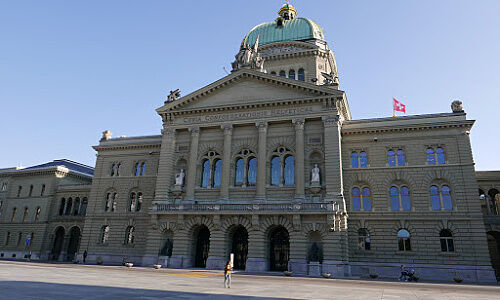While the world economy is sliding into a deep recession, governments and economists are working on plans to get the countries back on track. Does Switzerland also need a recovery plan and how would it be financed?
The coronavirus hasn't changed everything, but a fair bit. For years, the government of Switzerland announced new rounds of cuts to spending, only to be reigned in by parliament when the budget surplus once more proved bigger than forecast. The government happily reduced state debt year after year – in 2005, the gross debt of the federal government had reached a record 130 billion Swiss francs ($134 billion). Last year, the figure was down to 88.7 billion.
Now, faced with the biggest economic crisis for many decades, the government is prepared to spend money, a lot of money. For the money, the amount pledged for furloughed workers and emergency loans to guarantee liquidity for companies amounts to some 60 billion francs. The government more or less promised to keep the economy going as long as the shutdown lasts.
But still, Switzerland, one of the richest countries on earth, will go into recession – how long and deep depends on the time of the lockdown and the situation in the export markets. The money pledged by the government won't make up for the drop in demand that is likely to occur after the economy is allowed to move back up into gear.
And hence the first proposals have been made on how the impending recession might be alleviated.
1. Economic Recovery Package for Switzerland
The Swiss Social Democrats urged the government to line up a broad investment and economic growth program. The left-leaning party wants an infrastructure program to meet the climate goals, a program that would help trade and commerce and put the country back on track.
Such a program would cost billions of francs. After the crisis has been resolved, the government will have to find ways to pay back the billions it spent on emergency recovery. And at the same time, it will also have to get to grips with a drop in tax revenue from companies, taxpayers and from VAT as the economy is slowing down.
Conclusion: the plan sounds good and would presumably help a great many small companies and planning bureaus to keep going. But political realities will be even tougher than they normally are.
2. Crisis Provisions
(Picture: Shutterstock)
The handling of the crisis suggests – judged from the outside – that Switzerland has not been best prepared for the emergency. There was a lack of provisions for certain drugs and protective gear needed by hospitals. And while the country watched as hospitals prepared for the worst, the lockdown also highlighted the importance of food provisions.
Globalization hasn't just made it easier for viruses to quickly move from country to country. It also led to production chains where goods with low margins are produced in countries with low wages. While countries reintroduced export controls and shut their borders, finding supplies became harder – and hence some products got scarce.
The Swiss People's Party now wants Switzerland to become more self-reliant in the production of food. The erstwhile farmers' party envisages a 60 percent target rate for food and the safeguarding of essential goods.
Conclusion: what is attractive for Swiss farming and food producers requires substantial measures to curtail the free market economy, changes to free-trade agreements and a reconstruction of production facilities given up in recent decades. Who is to pay for such a program?
- Page 1 of 2
- Next >>






































